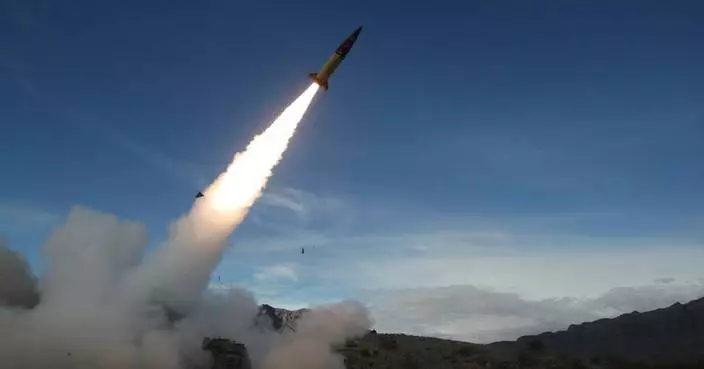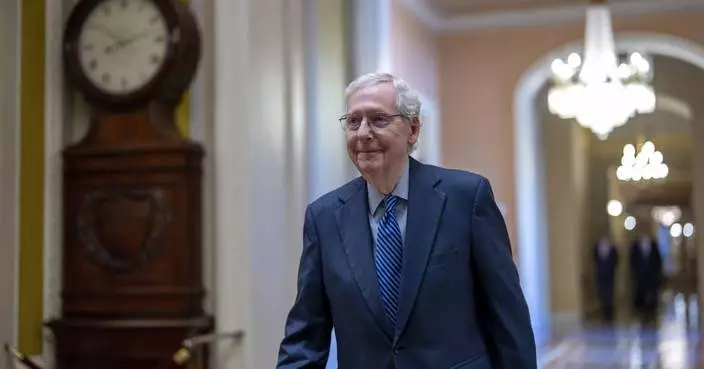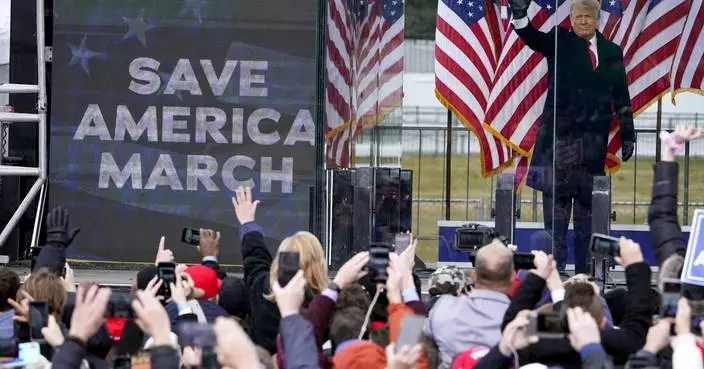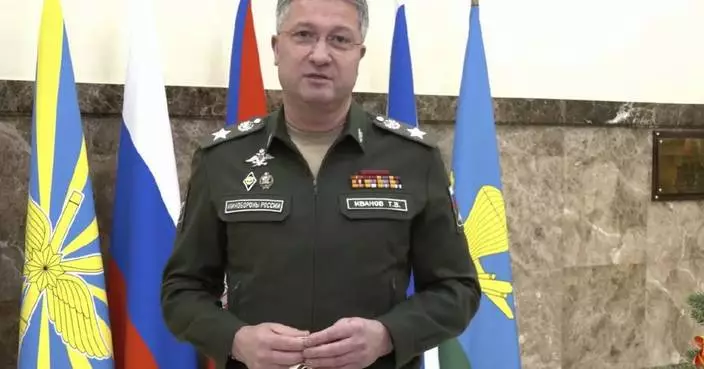Homeland Security Secretary Kirstjen Nielsen said Tuesday that she was unaware of intelligence assessments concluding that Russia favored President Donald Trump over Hillary Clinton in the 2016 election.
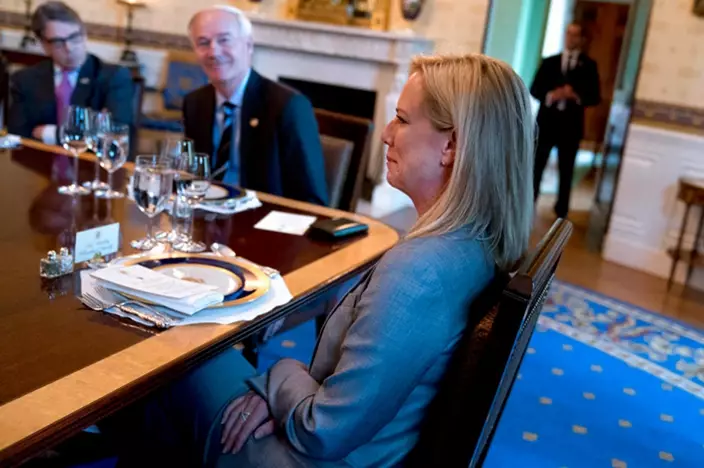
From left, Energy Secretary Rick Perry, Arkansas Gov. Asa Hutchinson, and Homeland Security Secretary Kirstjen Nielsen, attend a meeting with President Donald Trump and a group of governors in the Blue Room of the White House in Washington, Monday, May 21, 2018, to discuss border security and restoring safe communities. (AP Photo/Andrew Harnik)
The U.S. intelligence community said in a January 2017 assessment that Russia had tried to influence the election to benefit Trump.
"I do not believe I've seen that conclusion that the specific intent was to help President Trump win. I'm not aware of that," Nielsen said, responding to a reporter's question after briefing House members on election security efforts.
She said she believed the Russians have attempted to manipulate public confidence on both sides.
"We've seen them encourage people to go to a protest on one side. We've seen them simultaneously encourage people to go to that same protest on the other side. So I think what they're trying to do, in my opinion, and I defer to the Intel community is just disrupt our belief in our own understanding of what's happening."
A spokesman for the department later said that Nielsen had reviewed the intelligence community's assessment and agrees with it, but said the intelligence assessment language "is nuanced for a reason."
"Importantly, they targeted both major political parties. As the Secretary reiterated - their intent was to sow discord in the American electoral process," the spokesman Tyler Houlton said.
But the intelligence community's findings stated directly that the Russians sought to help Trump's candidacy, and the question the reporter had asked Nielsen was: "Do you any reason to doubt the Jan 2017 intelligence community assessment that said it was Vladimir Putin who meddled in the election to help President Trump win?"
Trump has expressed skepticism over whether the Russians tried to help him win the election.
But the Senate intelligence committee said last week that it agrees with the intelligence agencies' assessment. That was at odds with Republican members of the House intelligence committee, who said that while Russian President Vladimir Putin wanted to hamper Clinton's campaign, that didn't mean he wanted to help Trump.
The House committee said the intelligence agencies failed to use "proper analytic tradecraft" when they assessed Putin's intentions.
The top Democrat on the intelligence panel, Mark Warner, sent out a list a list of three separate occasions where the report of Russia's attempt to sway the election was made public. And Bennie Thompson, a Mississippi Democrat and ranking member of the House homeland security committee, said he'd personally deliver Nielsen a copy.
"This report is over a year old, has stood the test of time, was agreed to by the entire Intelligence Community, and was backed up by Senate investigators," he said in a statement.
About two weeks ago, the president unloaded on Nielsen at a heated Cabinet meeting — railing against her for failing to stop illegal border crossings.
UNITED NATIONS (AP) — Russia on Wednesday vetoed a U.N. resolution sponsored by the United States and Japan calling on all nations to prevent a dangerous nuclear arms race in outer space, calling it “a dirty spectacle” that cherry picks weapons of mass destruction from all other weapons that should also be banned.
The vote in the 15-member Security Council was 13 in favor, Russia opposed and China abstaining.
The resolution would have called on all countries not to develop or deploy nuclear arms or other weapons of mass destruction in space, as banned under a 1967 international treaty that included the U.S. and Russia, and to agree to the need to verify compliance.
U.S. Ambassador Linda Thomas-Greenfield said after the vote that Russian President Vladimir Putin has said Moscow has no intention of deploying nuclear weapons in space.
“Today’s veto begs the question: Why? Why, if you are following the rules, would you not support a resolution that reaffirms them? What could you possibly be hiding,” she asked. “It’s baffling. And it’s a shame.”
Russia’s U.N. Ambassador Vassily Nebenzia dismissed the resolution as “absolutely absurd and politicized,” and said it didn’t go far enough in banning all types of weapons in space.
Russia and China proposed an amendment to the U.S.-Japan draft that would call on all countries, especially those with major space capabilities, “to prevent for all time the placement of weapons in outer space, and the threat of use of force in outer spaces.”
The vote was 7 countries in favor, 7 against, and one abstention and the amendment was defeated because it failed to get the minimum 9 “yes” votes required for adoption.
The U.S. opposed the amendment, and after the vote Nebenzia addressed the U.S. ambassador saying: “We want a ban on the placement of weapons of any kind in outer space, not just WMDs (weapons of mass destruction). But you don’t want that. And let me ask you that very same question. Why?”
He said much of the U.S. and Japan’s actions become clear “if we recall that the U.S. and their allies announced some time ago plans to place weapons … in outer space.”
Nebenzia accused the U.S. of blocking a Russian-Chinese proposal since 2008 for a treaty against putting weapons in outer space.
Thomas-Greenfield accused Russia of undermining global treaties to prevent the spread of nuclear weapons, irresponsibly invoking “dangerous nuclear rhetoric,” walking away from several of its arms control obligations, and refusing to engage “in substantive discussions around arms control or risk reduction.”
She called Wednesday’s vote “a real missed opportunity to rebuild much-needed trust in existing arms control obligations.”
Thomas-Greenfield’s announcement of the resolution on March 18 followed White House confirmation in February that Russia has obtained a “troubling” anti-satellite weapon capability, although such a weapon is not operational yet.
Putin declared later that Moscow has no intention of deploying nuclear weapons in space, claiming that the country has only developed space capabilities similar to those of the U.S.
Thomas-Greenfield said before the vote that the world is just beginning to understand “the catastrophic ramifications of a nuclear explosion in space.”
It could destroy “thousands of satellites operated by countries and companies around the world — and wipe out the vital communications, scientific, meteorological, agricultural, commercial, and national security services we all depend on,” she said.
The defeated draft resolution said “the prevention of an arms race in outer space would avert a grave danger for international peace and security.” It would have urged all countries carrying out activities in exploring and using outer space to comply with international law and the U.N. Charter.
The draft would have affirmed that countries that ratified the 1967 Outer Space Treaty must comply with their obligations not to put in orbit around the Earth “any objects” with weapons of mass destruction, or install them “on celestial bodies, or station such weapons in outer space.”
The treaty, ratified by some 114 countries, including the U.S. and Russia, prohibits the deployment of “nuclear weapons or any other kinds of weapons of mass destruction” in orbit or the stationing of “weapons in outer space in any other manner.”
The draft resolution emphasized “the necessity of further measures, including political commitments and legally binding instruments, with appropriate and effective provisions for verification, to prevent an arms race in outer space in all its aspects.”
It reiterated that the U.N. Conference on Disarmament, based in Geneva, has the primary responsibility to negotiate agreements on preventing an arms race in outer space.
The 65-nation body has achieved few results and has largely devolved into a venue for countries to voice criticism of others’ weapons programs or defend their own. The draft resolution would have urged the conference “to adopt and implement a balanced and comprehensive program of work.”
At the March council meeting where the U.S.-Japan initiative was launched, U.N. Secretary-General António Guterres warned that “geopolitical tensions and mistrust have escalated the risk of nuclear warfare to its highest point in decades.”
He said the movie “Oppenheimer” about Robert Oppenheimer, who directed the U.S. project during World War II that developed the atomic bomb, “brought the harsh reality of nuclear doomsday to vivid life for millions around the world.”
“Humanity cannot survive a sequel to Oppenheimer,” the U.N. chief said.

United States Ambassador and Representative to the United Nations Linda Thomas-Greenfield addresses members of the U.N. Security Council before voting during a meeting on Non-proliferation of nuclear weapons, Wednesday, April 24, 2024 at United Nations headquarters. (AP Photo/Eduardo Munoz Alvarez)

FILE - U.S. Ambassador to United Nations Linda Thomas-Greenfield speaks on Thursday, April 18, 2024, in Tokyo. The U.N. Security Council is set to vote Wednesday, April 24, 2024, on a resolution announced by Thomas-Greenfield, calling on all nations to prevent a dangerous nuclear arms race in outer space. It is likely to be vetoed by Russia. (AP Photo/Eugene Hoshiko, Pool, File)






